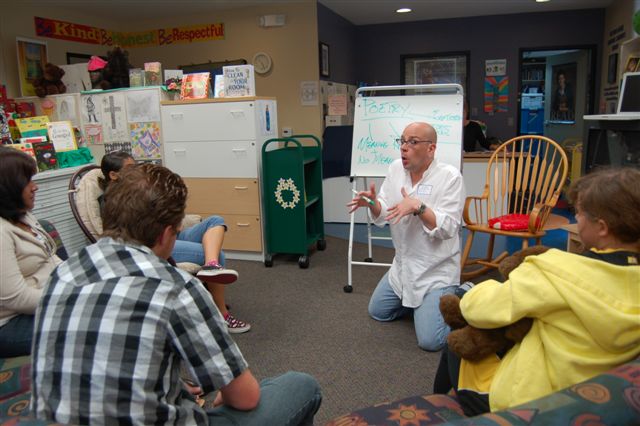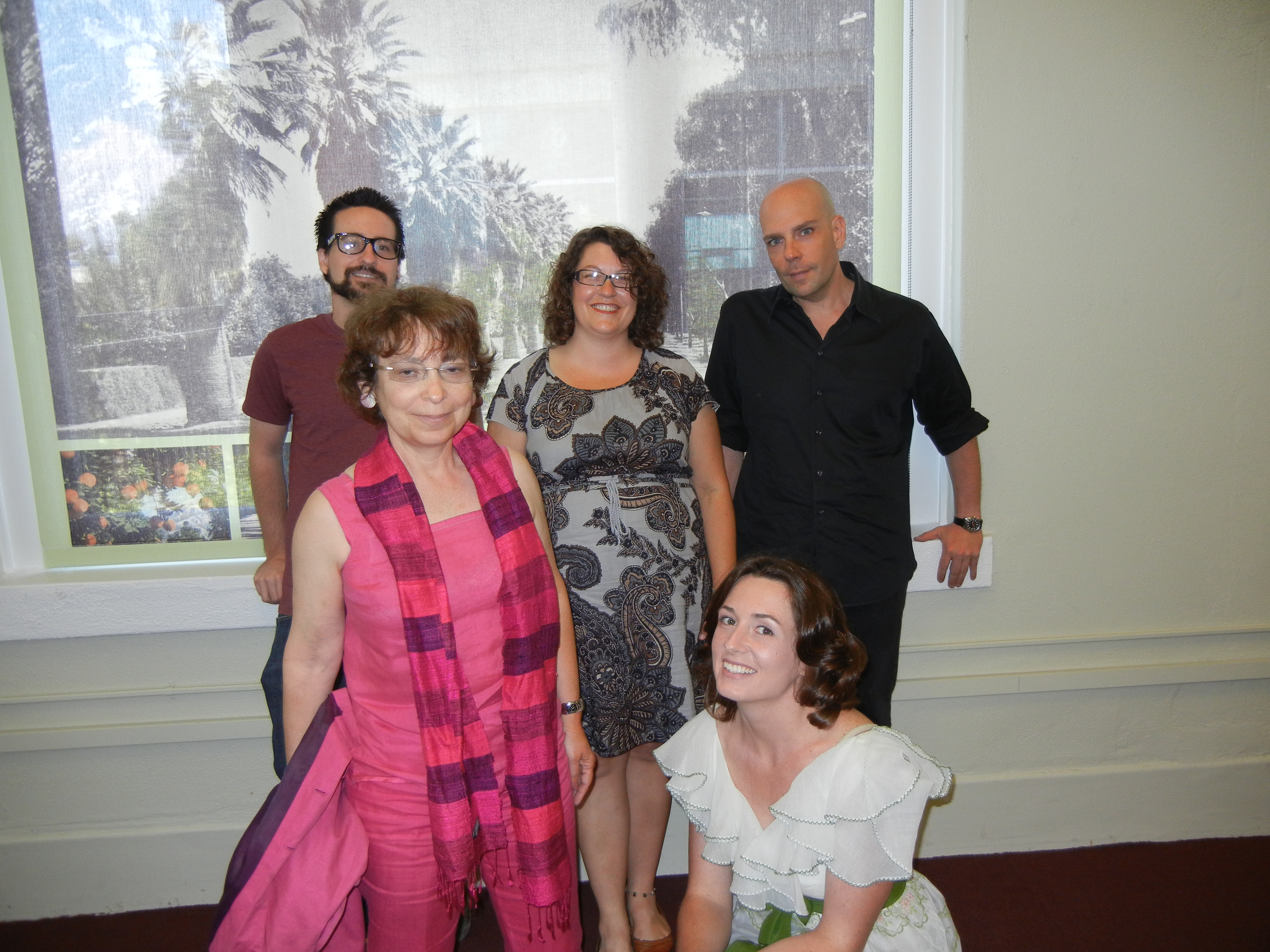Brendan Constantine, September’s Writer in Residence, was born in 1967 and named after Irish playwright Brendan Behan. An ardent supporter of Southern California’s poetry communities, he is one of the region’s most recognized authors. He is currently poet-in-residence at the Windward School and regularly conducts workshops in hospitals, foster homes, and with the Art of Elysium. His latest collections of poetry are Birthday Girl With Possum (2011 Write Bloody Publishing) and Calamity Joe (2012 Red Hen Press). He lives in Hollywood, California, at Bela Lugosi’s last address.
 How do you do. My name is Brendan Constantine and I’m a poet living in Hollywood, California. As I write this, there are two people arguing in the street beyond my window. One of them just shouted, “It’s not religious, it’s my God damn parking space.”
How do you do. My name is Brendan Constantine and I’m a poet living in Hollywood, California. As I write this, there are two people arguing in the street beyond my window. One of them just shouted, “It’s not religious, it’s my God damn parking space.”
As this month’s guest “blogger,” I’ve been asked to submit for your consideration my thoughts on poetry, poetry workshops, and what it’s like to work with Poets & Writers. As Howard Nemerov said, “I shall be interested to find out what I do think.”
One of the things I think is this: If you write poems, it’s easy to forget that poets are not the target market for poetry, any more than doctors are the only people who need medicine.
“Bastard!” That’s what the person outside just shouted. How on earth am I going work that into my point? I suppose I could make some parable (a lot of people have already) between the ideas of ‘bastardism’ or legitimacy and the status of poetry in art; the complaint among poets that their work is marginalized, de-prioritized and several other words ending with “-ized.”
Frankly I consider many of these complaints to be a stretch. Poetry is a legitimate art (as legitimate as painting, certainly) and it’s more readily available now than at any time previous. A disregard for poetry is not necessarily an uninformed response.
You can always have the best of something and still not like it. I, for one, can’t stand rhubarb pie. One might argue that poetry is a higher pursuit than pie, in which case we can change the analogy to Truth. Ever had enough of that? The guy outside my apartment has. I think he’s moving his car.
When I look at the histories of poetry, (not just in English), I see the same patterns emerge again and again: how it precedes written language, how its shapes and subjects evolve. People invent poetry as a means of expressing something they can’t easily say. The desire to talk about special things in a special way, the desire to change, elaborate or deliberately misuse language for the purpose of greater communion is all but universal.
Our work as poets, like it or not, is only ours while we’re writing it. Once we share, it belongs to the reader. Who is the reader? Anyone who reads, even by accident. Who is poetry for? Same answer. Is poetry for anyone in particular? Anyone who’s had to search for words. Is that really such an issue? You should hear the other guy outside. He’s finally trying to answer the last ten things that were shouted at him. He’s gotten this far: “Man, you’re like...you’re acting like... like...”
This is one of the reasons I enjoy conducting poetry workshops with people who have no desire to be professional poets. Every few months, for instance, Poets & Writers sends me to a foster care center in Pasadena. It’s called Hillsides and is home to a number of young people challenged by a variety of circumstances, among them homelessness, depression, and PTSD. I’m not there just to complement a standard education but to help cultivate an emotional vocabulary. As my friend, poet Ed Skoog, says, “Metaphor is a gateway to compassion.”
“Dude, that’s not what I’m saying. What I’m saying is you’re like totally... you’re getting all caught up with... you’re like a vulture that doesn’t care what it... I mean...” The guy outside is getting close to something. He’s still struggling, though. If he has any poetry in him, he may find the words. If he is a poet, the struggle won’t end.
Of course, there are other uses for poetry, other aims. There’s a lot of poetry that seems (to me, anyway) predicated on the idea that art is a debate, that each new work is a new argument in an old conversation about excellence; a necessary and relevant conversation, but not a very urgent one.
No, the most pressing topics are likely being mumbled in a car outside your door. Who knows where they will lead?
Meanwhile, thank you for having come this far with me. I hope you’ll visit this blog over the next weeks. All comments are welcome. See you next week.
Photo: Brendan Constantine with students at Hillsides in Pasadena, California. Credit: Nikola Wilkens-Miller.
Major support for Readings/Workshops in California is provided by The James Irvine Foundation. Additional support comes from the Friends of Poets & Writers.





 How do you do. My name is Brendan Constantine and I’m a poet living in Hollywood, California. As I write this, there are two people arguing in the street beyond my window. One of them just shouted, “It’s not religious, it’s my God damn parking space.”
How do you do. My name is Brendan Constantine and I’m a poet living in Hollywood, California. As I write this, there are two people arguing in the street beyond my window. One of them just shouted, “It’s not religious, it’s my God damn parking space.” For a number of years now, I had been contemplating the fact that there is no regularly occurring literary reading series in Riverside, California. This is not to say that there aren’t the occasional events, including an annual
For a number of years now, I had been contemplating the fact that there is no regularly occurring literary reading series in Riverside, California. This is not to say that there aren’t the occasional events, including an annual  Then Nicelle Davis read; I say read, but really, “audience engagement” is a more accurate description of what occured. Drawn from her collection Circe, which retells The Odyssey, Davis used puppets and props to invite readers to pluck the heart out of Odysseus the Pig, and to gouge out Circe’s eyes and pluck a booger from her nose.
Then Nicelle Davis read; I say read, but really, “audience engagement” is a more accurate description of what occured. Drawn from her collection Circe, which retells The Odyssey, Davis used puppets and props to invite readers to pluck the heart out of Odysseus the Pig, and to gouge out Circe’s eyes and pluck a booger from her nose.